MIT Lesson 10 Kanji: �$BBh#1#02]$N4A;z�(B
JP NET is grateful to Prof. Saeko Komori
of Chubu University for
permission to use the kanji movies at our site. All movie data is
copyright 1995, 1996 by Saeko Komori.
In the following definitions, on (Chinese-based) readings
are represented by katakana, and by capital romaji letters;
kun (native Japanese-based) readings are represented by
hiragana, and by lower-case romaji letters. This is a common
dictionary convention, and does not have any bearing on meaning.
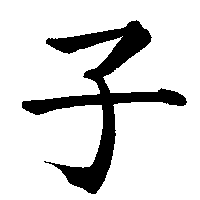
- Printed form:
- �$B;R�(B
- Readings:
- �$B$3�(B
- ko
- Meaning:
- child
- Mnemonic:
- The pictograph of a baby. [�$B3X�(B(�$B$,$/�(B)"learning"]
- Usage Examples:
- �$B>.$5$$;R�(B (�$B$A$$$5$$$3�(B) small child
- �$B;R$I$b�(B (�$B$3$I$b�(B) child
- �$B$*;R$5$s�(B (�$B$*$3$5$s�(B) child (polite)
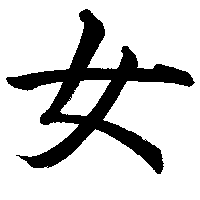
- Printed form:
- �$B=w�(B
- Readings:
- �$B$*$s$J�(B
- onna
- Meaning:
- woman
- Mnemonic:
- The pictograph of a woman. [�$B0B�(B(�$B$d$9�(B)"cheap; peaceful"]
- Usage Examples:
- �$B=w$N?M�(B (�$B$*$s$J$N$R$H�(B) woman
- �$B=w$N;R�(B (�$B$*$s$J$N$3�(B) girl
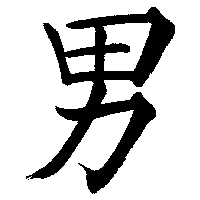
- Printed form:
- �$BCK�(B
- Readings:
- �$B$*$H$3�(B
- otoko
- Meaning:
- man
- Mnemonic:
- The pictograph of a man.
- Usage Examples:
- �$BCK$N?M�(B (�$B$*$H$3$N$R$H�(B) man
- �$BCK$N;R�(B (�$B$*$H$3$N$3�(B) boy
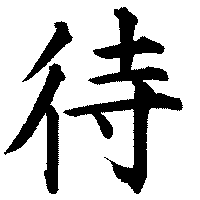
- Printed form:
- �$BBT�(B
- Readings:
- �$B$^�(B(�$B$D�(B)
- ma
- Meaning:
- to wait
- Mnemonic:
- When one is in trouble, he goes �$B9T�(B to a temple �$B;{�(B.
- Usage Examples:
- �$BBT$D�(B (�$B$^$D�(B) wait
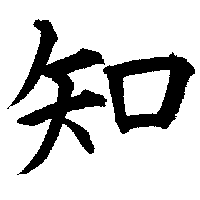
- Printed form:
- �$BCN�(B
- Readings:
- �$B$7�(B(�$B$k�(B)
- shi
- Meaning:
- to know
- Mnemonic:
- An arrow �$BLp�(B and its target (mouth; entrance) �$B8}�(B.
- Usage Examples:
- �$BCN$C$F$$$k�(B (�$B$7$C$F$$$k�(B) know
- �$BCN$i$J$$�(B (�$B$7$i$J$$�(B) not know
- �$BCN$j$^$;$s�(B (�$B$7$j$^$;$s�(B) not know

- Printed form:
- �$B:$�(B
- Readings:
- �$B$3$^�(B(�$B$k�(B)
- koma
- Meaning:
- to fall into trouble
- Mnemonic:
- A tree in a box cannot grow. Thus, it is in trouble.
[�$B9q�(B(�$B$3$/�(B)"country"]
- Usage Examples:
- �$B:$$k�(B (�$B$3$^$k�(B) become upset
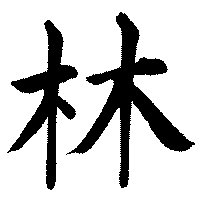
- Printed form:
- �$BNS�(B
- Readings:
- �$B$O$d$7�(B
- hayashi
- Meaning:
- forest
- Mnemonic:
- Two trees symbolize multiple trees in a forest.
- Usage Examples:
- �$BNS�(B (�$B$O$d$7�(B) forest
- �$B>.NS$5$s�(B (�$B$3$P$d$7$5$s�(B) (Mr/Ms) Kobayashi

- Printed form:
- �$B;E�(B
- Readings:
- �$B%7�(B
- SHI
- Meaning:
- labor
- Mnemonic:
- The person radical �$B%$�(B and a service man standing straight �$B;N�(B.
- Usage Examples:
- �$B;E;v�(B (�$B$7$4$H�(B) work
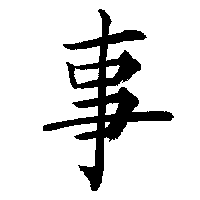
- Printed form:
- �$B;v�(B
- Readings:
- �$B$3$H�(B/�$B$4$H�(B/�$B%8�(B
- koto/goto/JI
- Meaning:
- matter; act; fact
- Mnemonic:
- A hand holding a bunch of sticks. [�$B=q�(B(�$B$+�(B)"to write"]
- Usage Examples:
- �$B2P;v�(B (�$B$+$8�(B) fire
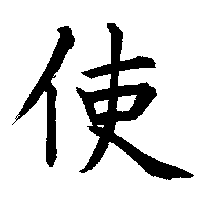
- Printed form:
- �$B;H�(B
- Readings:
- �$B$D$+�(B(�$B$&�(B)
- tsuka
- Meaning:
- to use
- Mnemonic:
- The person radical �$B%$�(B and the kanji for "officer" �$BMy�(B.
[�$B:n�(B(�$B$D$/�(B)"to make"]
- Usage Examples:
- �$B;H$&�(B (�$B$D$+$&�(B) use
- �$B;H$C$F$$$k�(B (�$B$D$+$C$F$$$k�(B) is using
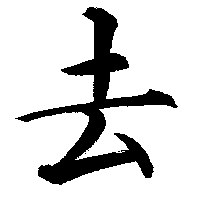
- Printed form:
- �$B5n�(B
- Readings:
- �$B%-%g�(B
- KYO
- Meaning:
- past
- Mnemonic:
- The earth �$BEZ�(B and a body coiled up �$B%`�(B under the ground.
- Usage Examples:
- �$B5nG/�(B (�$B$-$g$M$s�(B) last year
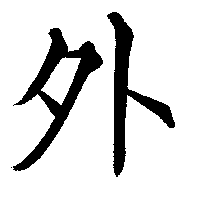
- Printed form:
- �$B30�(B
- Readings:
- �$B%,%$�(B/�$B$[$+�(B
- GAI/hoka
- Meaning:
- outside; other
- Mnemonic:
- Katakana �$B%?�(B and �$B%H�(B. What other katakata do you know?
- Usage Examples:
- �$B309q?M�(B (�$B$,$$$3$/$8$s�(B) foreigner
- �$B309q�(B (�$B$,$$$3$/�(B) foreign country
- �$B30$K2?$+�(B (�$B$[$+$K$J$K$+�(B) anything else?
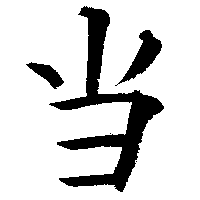
- Printed form:
- �$BEv�(B
- Readings:
- �$B%H%&�(B
- TOO
- Meaning:
- to hit (the mark)
- Mnemonic:
- A birthday cake with three candles. Today is your 3rd year
birthday... Really??
- Usage Examples:
- �$BK\Ev�(B (�$B$[$s$H$&�(B) real
- New Readings:
- �$B@h=5�(B (�$B$;$s$7$e$&�(B) last week
- �$B@h7n�(B (�$B$;$s$2$D�(B) last month
- �$B$"$N?M�(B (�$B$"$N$R$H�(B) that person
- �$B$"$NJ}�(B (�$B$"$N$+$?�(B) that person (polite)
- �$BBg?M�(B (�$B$*$H$J�(B) adult
- �$BOC$9�(B (�$B$O$J$9�(B) to talk












